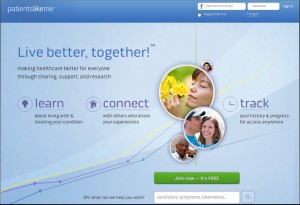 A small study of veterans with epilepsy, conducted by PatientsLikeMe and sponsored by pharmaceutical company UCB, shows that an online patient community can increase self-efficacy and self-management of patients. The study was published in the journal Neurology.
A small study of veterans with epilepsy, conducted by PatientsLikeMe and sponsored by pharmaceutical company UCB, shows that an online patient community can increase self-efficacy and self-management of patients. The study was published in the journal Neurology.
A total of 92 patients enrolled in the study and completed a six-month follow up survey, while an additional 157 consented to participate in the study but didn't complete the follow-up assessment. Researchers tracked how patients interacted with the PatientsLikeMe platform and, in the surveys, asked them questions about their confidence about managing their own care (self-efficacy) and self-reported frequency of management behaviors like taking medications and tracking seizures (self-management).
"A patient-powered research network, PatientsLikeMe, provides an epilepsy-specific support system, as well as digital tools for tracking seizures, symptoms, medications, and co-morbidities," the researchers wrote. "We sought to conduct a prospective study with a defined population of US veterans with epilepsy using validated survey measures of self-management and self-efficacy to determine the effectiveness of PLM. We hypothesized that an unstructured exposure to PLM would demonstrate statistically significant improvements in both self-management and self-efficacy."
Self-management scores increased 2.9 points after six weeks using the platform, while self-efficacy scores jumped 10.2 points. The specific subset of scores that improved the most was "information management," part of the self-management score.
Interestingly, usage statistics for the site didn't correlate with improvements in self-efficacy or self-management scores. On average, study completers logged in to the site five times. Some 15.2 percent of study completers posted a comment on the publicly visible forum, 8.7 percent left a profile comment on another study member’s personal page, and 29.4 percent sent a private message to another member of the PLM community.
"More than one-fourth of completers said that they had met a new person with epilepsy on the website, and 10 percent considered this new person to be a friend," the researchers wrote. "Nearly half agreed or strongly agreed that PLM gave them more or better control over their condition and helped them understand their seizures"
Although the results are modest, they are statistically significant, and researchers contend that that's enough for a foundational study, especially considering how scalable and accessible the platform is.
"As a cost-effective and more time-efficient alternative, online networks and management platforms offer more ubiquitous accessibility and a larger support system than traditional methods," they write. "If patient engagement is, as some claim, the 'blockbuster pill of the 21st century,' how will we support its development and implementation? If digital communities and online self-management tools do have the potential to improve clinical outcomes, then we have a shared responsibility to rethink our current health care ecosystem, focusing on new methods for incentivizing interventions that are proven to benefit patients."
Even when engagement is achieved, increasing patients' education or activation with a patient portal app can be hard to do. A recent study at Northwestern showed that when users and nonusers of a patient portal were asked questions about the information contained in the portal, in nearly every category there was no difference between the groups. The control group was actually slightly more knowledgable about planned tests and planned procedures.
















